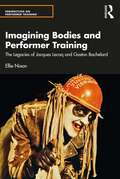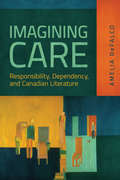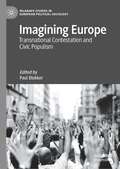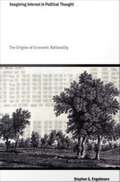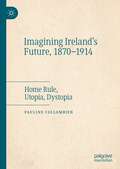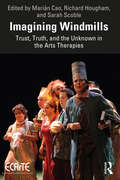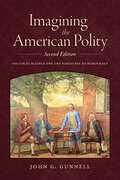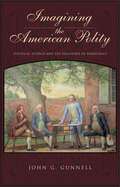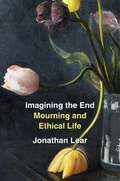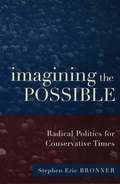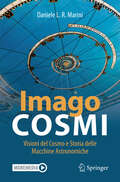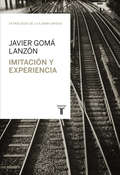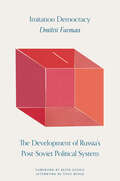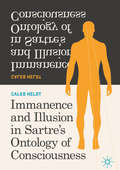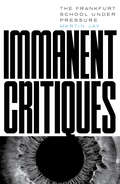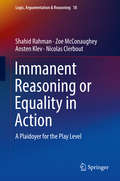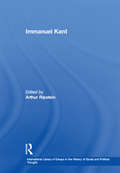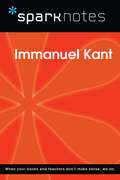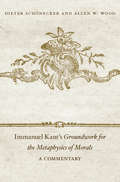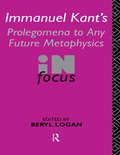- Table View
- List View
Imagining Bodies and Performer Training: The Legacies of Jacques Lecoq and Gaston Bachelard (Perspectives on Performer Training)
by Ellie NixonThis book is a practical and theoretical exploration of the embodied imagining processes of devised performance in which the human and more-than-human are co-implicated in the creative process.This study brings together the work of French theatre pedagogue Jacques Lecoq (1921–1999) and French philosopher of science and the imagination Gaston Bachelard (1884–1962) to explore the notion of the imagination as embodied, enactive and embedded in the devising process. An exploration of compelling correspondences with Bachelard, whose writings imbue Lecoq’s teaching ethos, offers new practical and theoretical perspectives on Lecoq’s ‘poetic body’ in contemporary devising practices. Interweaving first-hand accounts by the author and interviews with contemporary international creative practitioners who have graduated from or have been deeply influenced by Lecoq, Imagining Bodies in Performer Training interrogates how his teachings have been adapted, developed and extended in various cultural, political and historical settings, in Europe, Scandinavia, Asia, and North and South America.These new and rich insights reveal a teaching approach that resists fixity and instead unfolds, develops and adapts to the diverse cultural and political contexts of its practitioners, teachers and students.
Imagining Care: Responsibility, Dependency, and Canadian Literature
by Amelia DefalcoImagining Care brings literature and philosophy into dialogue by examining caregiving in literature by contemporary Canadian writers alongside ethics of care philosophy. Through close readings of fiction and memoirs by Margaret Atwood, Alice Munro, Michael Ignatieff, Ian Brown, and David Chariandy, Amelia DeFalco argues that these narratives expose the tangled particularities of relations of care, dependency, and responsibility, as well as issues of marginalisation on the basis of gender, race, and class.DeFalco complicates the myth of Canada as an unwaveringly caring nation that is characterized by equality and compassion. Caregiving is unpredictable: one person's altruism can be another's narcissism; one's compassion, another's condescension or even cruelty. In a country that conceives of itself as a caring society, these texts depict in stark terms the ethical dilemmas that arise from our attempts to respond to the needs of others.
Imagining Europe: Transnational Contestation and Civic Populism (Palgrave Studies in European Political Sociology)
by Paul BlokkerThis book provides an extensive analysis and discussion of the transnational mobilization of citizens and youth, alongside the production of creative, imaginative, and constructive solutions to the European crisis. The volume provides a variety of interdisciplinary analyses, as well as a series of perspectives on populism that have not been addressed extensively, including an examination of left-wing populism, the constituent power dimension of populism, and transnational manifestations of populism, contributing to debates on political science, political sociology, social movements studies, and political and constitutional theory.
Imagining Interest in Political Thought: Origins of Economic Rationality
by Stephen G. EngelmannImagining Interest in Political Thought argues that monistic interest--or the shaping and coordination of different pursuits through imagined economies of self and public interest--constitutes the end and means of contemporary liberal government. The paradigmatic theorist of monistic interest is the English political philosopher Jeremy Bentham (1748-1832), whose concept of utilitarianism calls for maximization of pleasure by both individuals and the state. Stephen G. Engelmann contends that commentators have too quickly dismissed Bentham's philosophy as a crude materialism with antiliberal tendencies. He places Benthamite utilitarianism at the center of his account and, in so doing, reclaims Bentham for liberal political theory. Tracing the development of monistic interest from its origins in Reformation political theory and theology through late-twentieth-century neoliberalism, Engelmann reconceptualizes the history of liberalism as consisting of phases in the history of monistic interest or economic government. He describes how monistic interest, as formulated by Bentham, is made up of the individual's imagined expectations, which are constructed by the very regime that maximizes them. He asserts that this construction of interests is not the work of a self-serving manipulative state. Rather, the state, which is itself subject to strict economic regulation, is only one cluster of myriad "public" and "private" agencies that produce and coordinate expectations. In place of a liberal vision in which government appears only as a protector of the free pursuit of interest, Engelmann posits that the free pursuit of interest is itself a mode of government, one that deploys individual imagination and choice as its agents.
Imagining Ireland's Future, 1870-1914: Home Rule, Utopia, Dystopia
by Pauline CollombierThis book attempts to delve into the connection between imagination and politics, and examines the many expectations and fears engendered by the Irish home rule debate. More specifically, it assesses the ways politicians, artists and writers in Ireland, Britain and its empire imagined how self-government would work in Ireland after the restitution of an Irish parliament. What did home rulers want? What were British supporters of Irish self-government willing to offer? What did home rule mean not only to those who advocated it but also to those who opposed it?
Imagining Modern Democracy: A Habermasian Assessment of the Philippine Experiment
by Ranilo Balaguer HermidaWinner of the 2016 Outstanding Scholarly Work Award for the School of Humanities presented by Ateneo de Manila UniversityThis book is a pioneering study of Philippine democracy, one of the oldest in the Asian region, vis-à-vis Habermasian critical theory. Proceeding from a concise examination of the theory of law and democracy found in Habermas's Between Facts and Norms, Ranilo Balaguer Hermida explains how the law occupies the central role in both the legitimation of political power and the attainment of social integration. He then discusses how Habermas proposes to resolve the tension that exists in modern society between democratic norms and social facts, through the adoption of a lawmaking procedure whereby the informal sources of issues and opinions from the public sphere are allowed to develop and interact with the formal deliberations and decision processes inside the political system. He also explores certain provisions of the present Philippine Constitution that were expressly intended to restore democratic institutions and processes destroyed by decades of martial law, as well as the problems and hindrances that stand in the way of their full implementation.
Imagining Windmills: Trust, Truth, and the Unknown in the Arts Therapies
by Richard Hougham Sarah Scoble Marián CaoImagining Windmills presents a compilation of scholarly chapters by selected authors of global standing in the arts therapies. This book reflects the theme of the 15th International Conference of the European Consortium for Arts Therapies (ECArTE), held in Alcalá de Henares, Spain, birthplace of Miguel de Cervantes. This innovative work seeks to further understanding of arts therapy education, practice and research and incorporates current thinking from art therapists, dance-movement therapists, dramatherapists and music therapists. Writers from Belgium, Germany, Greece, India, Israel, Italy, The Netherlands, Spain, Sweden, UK and USA combine to give an international voice to the book, which celebrates cultural distinctiveness, while also presenting shared intercultural developments in the professions. This interdisciplinary publication explores questions of the unknown and the imagined, misconception, delusion, truth and trust in the arts therapies. It enquires into ways in which education and the practice of the arts therapies engage with the imagination as a place of multiple realities, which may lead us closer to finding our truth. This book will be of interest and relevance not only to those in the arts therapeutic community, but also to a broad audience including those in related professions – for instance psychology, sociology, the arts, medicine, health and wellbeing and education.
Imagining the American Polity, Second Edition: Political Science and the Discourse of Democracy
by John G. GunnellAmericans have long prided themselves on living in a country that serves as a beacon of democracy to the world, but from the time of the founding they have also engaged in debates over what the criteria for democracy are as they seek to validate their faith in the United States as a democratic regime. In this book John G. Gunnell shows how the academic discipline of political science has contributed in a major way to this ongoing dialogue, thereby playing a significant role in political education and the formulation of popular conceptions of American democracy. Gunnell traces the dynamics of conceptual change and continuity as American political science evolved from a focus in the nineteenth century on the idea of the state, through the emergence of a pluralist theory of democracy in the 1920s and its transfiguration into liberalism in the mid- 1930s, up to the rearticulation of pluralist theory in the 1950s and its resurgence, yet again, in the 1990s. Along the way he explores how political scientists have grappled with a fundamental question about popular sovereignty: Does democracy require a people and a national democratic community, or can the requisites of democracy be achieved through fortuitous social configurations coupled with the design of certain institutional mechanisms?
Imagining the American Polity: Political Science and the Discourse of Democracy (G - Reference, Information and Interdisciplinary Subjects)
by John G. GunnellAmericans have long prided themselves on living in a country that serves as a beacon of democracy to the world, but from the time of the founding they have also engaged in debates over what the criteria for democracy are as they seek to validate their faith in the United States as a democratic regime. In this book John Gunnell shows how the academic discipline of political science has contributed in a major way to this ongoing dialogue, thereby playing a significant role in political education and the formulation of popular conceptions of American democracy. Using the distinctive “internalist” approach he has developed for writing intellectual history, Gunnell traces the dynamics of conceptual change and continuity as American political science evolved from a focus in the nineteenth century on the idea of the state, through the emergence of a pluralist theory of democracy in the 1920s and its transfiguration into liberalism in the mid-1930s, up to the rearticulation of pluralist theory in the 1950s and its resurgence, yet again, in the 1990s. Along the way he explores how political scientists have grappled with a fundamental question about popular sovereignty: Does democracy require a people and a national democratic community, or can the requisites of democracy be achieved through fortuitous social configurations coupled with the design of certain institutional mechanisms?
Imagining the End: Mourning and Ethical Life
by Jonathan Lear“Imagining the End suggests, in a sober yet hopeful spirit, how mourning, rightly understood, can give meaning to our lives in the disenchanted times in which we find ourselves. In exploring the hopes that have failed us, the projects that have run into the sand, the loves we have lost, the attachments that have come to an end—a work of what amounts to creative mourning—we can develop a stance in the here and how from which the psyche can look outward and flourish. As he did earlier in his explorations of what it can mean to hope, Jonathan Lear here expands and deepens our understanding of what it can mean to mourn.”—J. M. Coetzee, Nobel LaureateA leading philosopher explores the ethics and psychology of flourishing during times of personal and collective crisis.Imagine the end of the world. Now think about the end—the purpose—of life. They’re different exercises, but in Jonathan Lear’s profound reflection on mourning and meaning, these two kinds of thinking are also connected: related ways of exploring some of our deepest questions about individual and collective values and the enigmatic nature of the good.Lear is one of the most distinctive intellectual voices in America, a philosopher and psychoanalyst who draws from ancient and modern thought, personal history, and everyday experience to help us think about how we can flourish, or fail to, in a world of flux and finitude that we only weakly control. His range is on full display in Imagining the End as he explores seemingly disparate concerns to challenge how we respond to loss, crisis, and hope.He considers our bewilderment in the face of planetary catastrophe. He examines the role of the humanities in expanding our imaginative and emotional repertoire. He asks how we might live with the realization that cultures, to which we traditionally turn for solace, are themselves vulnerable. He explores how mourning can help us thrive, the role of moral exemplars in shaping our sense of the good, and the place of gratitude in human life. Along the way, he touches on figures as diverse as Aristotle, Abraham Lincoln, Sigmund Freud, and the British royals Harry and Meghan.Written with Lear’s characteristic elegance, philosophical depth, and psychological perceptiveness, Imagining the End is a powerful meditation on persistence in an age of turbulence and anxiety.
Imagining the Possible: Radical Politics for Conservative Times
by Stephen Eric BronnerJean-Paul Sartre originally made the term engagement a part of the existentialist vocabulary following WWII. It imples the responsibility of intervening in social or political conflicts in the hope of fostering freedom. Imagining the Possible opens different windows upon this particular engagement.
Imago Cosmi: Visioni del Cosmo e Storia delle Macchine Astronomiche
by Daniele L. MariniQuesto libro conduce il lettore in un viaggio esplorativo attraverso il Cosmo, dall'antica Mesopotamia ed Egitto fino alla Cina, svelando il fascino dello sviluppo dell'astronomia e della matematica che ha dato vita alla rivoluzione scientifica. Dopo una panoramica sulle origini di questi campi di studio, evidenziando i contributi degli astronomi greci, della cultura araba e del modello eliocentrico di Copernico, il testo si addentra nel lavoro rivoluzionario di Tycho Brahe, Johannes Kepler, Galileo Galilei e Isaac Newton, offrendo una comprensione approfondita del sistema solare. Gli strumenti utilizzati dagli astronomi, tra cui gli orologi astronomici e le macchine planetarie più significative, sono al centro dell'attenzione, consentendo di comprendere meglio la formazione e la diffusione della concezione del Sistema Solare. Inoltre, l'autore esamina il poco conosciuto progetto di una macchina planetaria di Kepler e ne offre un'interpretazione utilizzando tecniche di realtà virtuale. Il libro mette in luce anche la visione cinese del Cosmo e l'evoluzione della sua astronomia e delle relative macchine, offrendo ai lettori una prospettiva unitaria sulla concezione del cosmo e della tecnologia in Occidente e nell'Estremo Oriente. I dati degli ingranaggi e dei periodi planetari delle macchine esaminate nel testo sono raccolti tra gli annessi web del libo. L'esperienza di lettura è arricchita dalla traduzione della descrizione della macchina planetaria di Christian Huygens e dalla trattazione del progetto e della realizzazione di un Tellurium per comprendere la costruzione e la meccanica delle macchine astronomiche. Inoltre, viene offerta una visione unica sulle influenze religiose sugli studi astronomici del XVIII secolo attraverso la traduzione del libro Cyclus di Johann Albrecht Bengel. Breve materiale video sull'Antikythera, sul Tellurium dell'autore e su quello di Philip M. Hahn completa la documentazione. Questo libro è un must per chiunque sia interessato alla storia della scienza e della tecnologia, appassionando sia gli astronomi, i matematici e i fisici che gli storici della scienza e della tecnologia, fornendo descrizioni affascinanti e analisi illuminanti della visione del Cosmo dalle sue prime concezioni fino ai giorni nostri. Video e documenti disponibili tramite app: scarica gratuitamente l'app SN More Media, scansiona il link con il tasto play e accedi ai video e ai documenti direttamente sul tuo smartphone o tablet.
Imitación y experiencia (Tetralogía de la Ejemplaridad)
by Javier Gomá LanzónImitación y experiencia establece los fundamentos de una teoría general de la ejemplaridad, con su parte pragmática y su parte metafísica, poniendo así los cimientos filosóficos sobre los que descansan los otros tres títulos de esta tetralogía. La imitación es una de esas ideas fundamentales de la cultura occidental que, como la del ser, recorre todo el pensamiento europeo de un extremo a otro. <P><P>Para crear el contexto de comprensión adecuado, este libro, como paso previo, recupera una tradición de conceptos clásicos de la cultura como los de modelo, ejemplo o imitación. A través de una extensa investigación, reúne y ordena el vasto material bibliográfico disponible para narrar por primera vez la historia de la teoría de la ejemplaridad desde los orígenes hasta nuestros días distinguiendo entre cuatro clases de imitación y tres grandes etapas culturales. <P><P> Cada uno de los títulos de esta tetralogía es autónomo y de lectura independiente y al mismo tiempo los cuatro forman parte de un plan unitario en torno a la idea de ejemplaridad: su historia y su teoría general (Imitación y experiencia), su formación subjetiva (Aquiles en el gineceo), su aplicación a la esfera política (Ejemplaridad pública) y su relación con la esperanza (Necesario pero imposible). Esta edición culmina un plan literario-filosófico muy antiguo y largamente cultivado por el autor.
Imitation Democracy: The Development of Russia's Post-Soviet Political System
by Dmitrii FurmanExamines the history and functioning of Russia's post-Soviet political system–an &“imitation democracy&”After the collapse of the Soviet Union, Russia under Yeltsin and Putin implemented a political system of &“imitation democracy,&” marked by &“a huge disparity between formal constitutional principles and the reality of authoritarian rule.&” How did this system take shape, how else might it have developed, and what are the prospects for re-envisioning it more democratically in the future?These questions animate Dmitrii Furman&’s Imitation Democracy, a welcome antidote to books that blandly decry Putin as an omnipotent dictator, without considering his platforms, constituencies, and sources of power. With extensive public opinion polling drawn from throughout the late- and post-Soviet period, and a thorough knowledge of both official and unofficial histories, Furman offers a definitive account of the formation of the modern Russian political system, casting it into powerful relief through comparisons with other post-Soviet states.Peopled with grey technocrats, warring oligarchs, patriots, and provocateurs, Furman&’s narrative details the struggles among partisan factions, and the waves of public sentiment, that shaped modern Russia&’s political landscape, culminating in Putin&’s third presidential term, which resolves the contradiction between the &“form&” and &“content&” of imitation democracy, &“the formal dependence of power on elections and the actual dependence of elections on power.&”
Immanence and Illusion in Sartre’s Ontology of Consciousness
by Caleb HeldtThis book is a critical re-evaluation of Jean-Paul Sartre’s phenomenological ontology, in which a theory of egological complicity and self-deception informing his later better known theory of bad faith is developed. This novel reinterpretation offers a systematic challenge to orthodox apprehensions of Sartre’s conceputualization of transcendental consciousness and the role that the ego plays within his account of pre-reflective consciousness. Heldt persuasively demonstrates how an adequate comprehension of Sartre’s theories of negation and reflection can reveal the world as it appears to human consciousness as one in which our reality is capable of becoming littered with illusions. As the foundation upon which the rest of Sartre’s philosophical project is built, it is essential that the phenomenological ontology of Sartre’s early writings be interpreted with clarity. This book provides such a reinterpretation. In doing so, a philosophical inquiry emerges which is genuinely contemporary in its aim and scope and which seeks to demonstrate the significance of Sartre’s thought, not only as significant to the history of philosophy, but to ongoing debates in continental philosophy and philosophy of mind.
Immanent Critiques: The Frankfurt School under Pressure
by Martin JayThe Frankfurt School&’s own legacy is best preserved by exercising an immanent critique of its premises and the conclusions to which they often led. By distinguishing between what is still and what is no longer alive in Critical Theory, these essays seek to demonstrate its continuing relevance in the 21st century.Fifty years after the appearance of The Dialectical Imagination, his pioneering history of the Frankfurt School, Martin Jay reflects on what may be living and dead in its legacy. Rather than treating it with filial piety as a fortress to be defended, he takes seriously its anti-systematic impulse and sensitivity to changing historical circumstances. Honouring the Frankfurt School's practice of immanent critique, he puts critical pressure on a number of its own ideas by probing their contradictory impulses.Among them are the pathologization of political deviance through stigmatizing "authoritarian personalities," the undefended theological premises of Walter Benjamin's work, and the ambivalence of its members' analyses of anti-Semitism and Zionism. Additional questions are asked about other time-honored Marxist themes: the meaning of alienation, the alleged damages of abstraction, and the advocacy of a politics based on a singular notion of the truth.Rather, however, than allowing these questions to snowball into an unwarranted repudiation of the Frankfurt School legacy as a whole, the essays also acknowledge a number of its still potent arguments. They explore its neglected, but now timely analysis of "racket society," Adorno's dialectical reading of aesthetic sublimation, and the unexpected implications of Benjamin's focus on the corpse for political theory. Jay shows that it is a still evolving theoretical tradition which offers resources for the understanding of–and perhaps even practical betterment–of our increasingly troubled world.
Immanent Reasoning or Equality in Action: A Plaidoyer For The Play Level (Logic, Argumentation And Reasoning Ser. #18)
by Shahid Rahman Nicolas Clerbout Zoe McConaughey Ansten KlevThis monograph proposes a new way of implementing interaction in logic. It also provides an elementary introduction to Constructive Type Theory (CTT). The authors equally emphasize basic ideas and finer technical details. In addition, many worked out exercises and examples will help readers to better understand the concepts under discussion.One of the chief ideas animating this study is that the dialogical understanding of definitional equality and its execution provide both a simple and a direct way of implementing the CTT approach within a game-theoretical conception of meaning. In addition, the importance of the play level over the strategy level is stressed, binding together the matter of execution with that of equality and the finitary perspective on games constituting meaning.According to this perspective the emergence of concepts are not only games of giving and asking for reasons (games involving Why-questions), they are also games that include moves establishing how it is that the reasons brought forward accomplish their explicative task. Thus, immanent reasoning games are dialogical games of Why and How.
Immanuel Kant
by Andrews Reath Mary GregorThis is the first English translation of all of Kant's writings on moral and political philosophy collected in a single volume. No other collection competes with the comprehensiveness of this one. As well as Kant's most famous moral and political writings, the Groundwork to the Metaphysics of Morals, the Critique of Practical Reason, the Metaphysics of Morals, and Toward Perpetual Peace, the volume includes shorter essays and reviews, some of which have never been translated before. There is also an English-German and German-English glossary of key terms.
Immanuel Kant
by Manfred Kuehn Robert B. LoudenIn this two-volume collection, Klemme (Institut fr Philosophie, Otto-von-Guericke Universitt) and Kuehn (philosophy, Purdue U. ) present some of the best discussion of Kant in English, i. e. those selections which are either classics or deserve to be classics. Volume I, 25 essays, discusses his theoretical philosophy. Although a small section is devoted to the concept of teleology, the main focus is upon the transcendental aesthetic and logic rather than upon the dialectic. Volume II, 25 essays, deals with aspects of his practical philosophy such as the moral, the political, the philosophy of law and history, the highest good and the philosophy of religion, and Kant in context. The original essays, written between 1937 and 1996, are reproduced in full. Lacks a subject index. Annotation c. Book News, Inc. , Portland, OR (booknews. com)
Immanuel Kant (International Library of Essays in the History of Social and Political Thought)
by Arthur RipsteinKant casts a long shadow over contemporary debates in political philosophy. The Kantian roots of ideas of dignity, autonomy, equality and freedom under law are widely acknowledged. Kant’s own developments of those ideas in his explicitly political writings are taken up less frequently. The aim of this volume is to help bring those contributions out of the shadows. The articles and essays explore various dimensions of Kant’s complex and powerful picture of the relation between morality and politics that Kant develops.
Immanuel Kant (SparkNotes Philosophy Guide)
by SparkNotesImmanuel Kant (SparkNotes Philosophy Guide) Making the reading experience fun! Created by Harvard students for students everywhere, SparkNotes is a new breed of study guide: smarter, better, faster. Geared to what today's students need to know, SparkNotes provide:Chapter-by-chapter analysis Explanations of key themes, motifs, and symbols A review quiz and essay topics Lively and accessible, these guides are perfect for late-night studying and writing papers.
Immanuel Kant's Groundwork for the Metaphysics of Morals: A Commentary
by Immanuel Kant Allen W. Wood Dieter SchöneckerA defining work of moral philosophy, Kant's Groundwork for the Metaphysics of Morals has been influential to an extent far beyond what its modest length (roughly 75 pages) might suggest. It is also a famously difficult work, concerned with propounding universal principles rather than answering practical questions. As even professional philosophers will admit, first-time readers are not alone in finding some of its arguments perplexing. Offering an introduction that is accessible to students and relevant to specialized scholars, Dieter Schönecker and Allen Wood make luminously clear the ways the Groundwork for the Metaphysics of Morals forms the basis of our modern moral outlook: that all human beings have equal dignity as ends in themselves; that every rational being is a self-governing agent whose morality freely derives from his or her own will; and that all rational beings constitute an ideal community, bound only by the moral laws they have agreed upon. Schönecker and Wood explain key Kantian concepts of duty, the good will, and moral worth, as well as the propositions Kant uses to derive his conception of the moral law. How the law relates to freedom, and the significance of the free will within Kant's overall philosophy are rigorously interrogated. Where differing interpretations of Kant's claims are possible, the authors provide alternative options, giving arguments for each. This critical introduction will help readers of the Groundwork gain an informed understanding of Kant's challenging but central philosophical work.
Immanuel Kant's Groundwork for the Metaphysics of Morals: A Commentary
by Dieter SchöneckerA defining work of moral philosophy, Groundwork for the Metaphysics of Morals has been highly influential and famously difficult. Dieter Schönecker and Allen Wood make clear the ways this work forms the basis of our modern moral outlook and how moral law relates to freedom and free will within Kant's overall philosophy.
Immanuel Kant's Prolegomena to Any Future Metaphysics in Focus (Philosophers in Focus)
by Beryl LoganThis collection of seminal essays on the Prolegomena provides the student of philosophy with an invaluable overview of the issues and problems raised by Kant. Starting with the Carus translation of Kant's work, the edition offers a substantive new introduction, six papers never before published together and a comprehensive bibliography. Special attention is paid to the relationship between Kant and David Hume, whose philosophical investigations, according to Kant's famous quote, first interrupted Kant's 'dogmatic slumber'.
Immanuel Kant: Anthropology, History, and Education
by Immanuel Kant Günter Zöller Robert B. LoudenAnthropology, History, and Education, first published in 2007, contains all of Kant's major writings on human nature. Some of these works, which were published over a thirty-nine year period between 1764 and 1803, had never before been translated into English. Kant's question 'What is the human being?' is approached indirectly in his famous works on metaphysics, epistemology, moral and legal philosophy, aesthetics and the philosophy of religion, but it is approached directly in his extensive but less well-known writings on physical and cultural anthropology, the philosophy of history, and education which are gathered in the present volume. Kant repeatedly claimed that the question 'What is the human being?' should be philosophy's most fundamental concern, and Anthropology, History, and Education can be seen as effectively presenting his philosophy as a whole in a popular guise.
